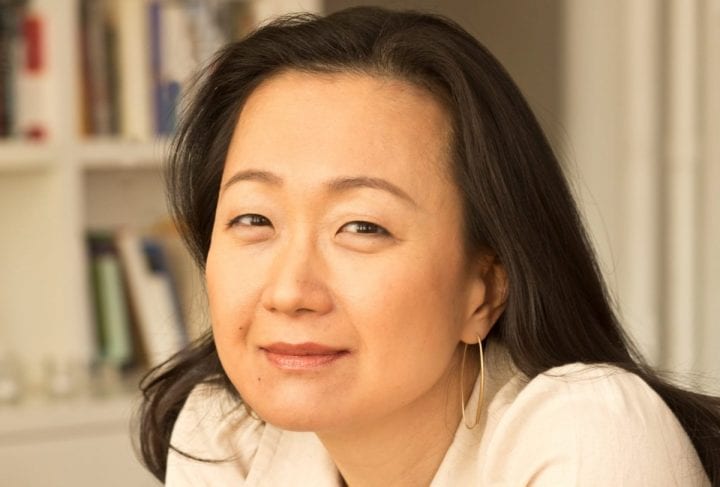
Introductions: Min Jin Lee
June 24, 2020
By Ruth Dickey, SAL Executive Director
I read most of Min Jin Lee’s Pachinko on a plane, back when we flew on planes and had the sensation of the whole world condensed to our single seat, the luxury of hours focused on a single book. It’s a special sort of reading time that’s hard to find in life – this uninterrupted bubble – and it was perfect for diving deeply into this fascinating saga spanning four generations of Koreans who have immigrated to Japan.
In one of my favorite passages, Lee writes about a mother, Estuko, remembering her children’s youth. She writes, “She wished she could take back the times she had scolded her children just because she was tired. There were so many errors. If life allowed revisions, she would let them stay in their bath a little longer, read them one more story before bed, and fix them another plate of shrimp.”
I love this passage, and to me it encapsulates the heart of both Pachinko and Free Food for Millionaires, Lee’s debut novel. These novels explore immigration and class, family and love. What it means to strain between your own desires and your responsibilities to family, to community. What it means to love, and to love complicatedly, while exhausted, through struggle, through disappointment, through hunger. What it means to be generous, to be loyal, to be afraid, to be free. And whether through Leah and Casey in New York in the 1990s or Sunja and Etsuko in Japan in the 1930s or 1970s, Lee gives us the worlds of women making their homes in new countries and the choices they face, the freedoms they long for, the weights they must carry.
Min Jin Lee is the recipient of Guggenheim and Radcliff Fellowships, and the author of the New York Times bestselling Free Food for Millionaires, which was named a top 10 Book of the Year by the Times of London, NPR’s Fresh Air, and USA Today. Her second novel, Pachinko, was a finalist for the National Book Award in Fiction, and on over 75 best book of the year lists. Pachinko was selected for “Now Read This,” the book club of the PBS Newshour and the New York Times, picked by President Obama for his recommended reading list, and translated into more than 27 languages.
In a recent New York Times editorial, Lee wrote about getting takeout noodles during the pandemic, a piece celebrating the worth and importance of each person behind a counter. She wrote, “My city is five boroughs, and each borough has many neighborhoods, and each neighborhood is made up of numerous blocks, and on each block there are businesses, and in each one, there is a counter, and that’s where you and I meet.” This is the gift of Min Jin Lee’s writing—through her intricate stories and unforgettable characters, Lee brings us exactly here, to the counters and the places where we meet, and illuminates the ways we need one another, the lives we see and do not see, the complexity and inherent value in each one.
Min Jin Lee gave an online lecture on June 15, 2020, as part of our 2019/20 Literary Arts Series; SAL Executive Director Ruth Dickey delivered this introduction.